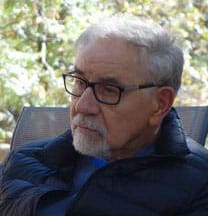The smallish man, an observant Jew named Eliyahu McLean, smiled impishly at the crowd who’d come to listen to his stories of trying to create interfaith peace in the holy land. “We gathered around the walls of the old city, arm in arm, and it just grew,” he said. “Arab shopkeepers joined in, so did religious Christians on their way to Via Dolorosa. Even a female Israeli soldier in uniform danced with joy.” McLean, 42, bearded, wore a tight-knit kippah and embroidered vest. His payot looked like dreadlocks.
“The first time we did the Jerusalem Hug, five years ago,” McLean said, “some participants told us they weren’t used to an event like this, because we weren’t protesting against anything. Instead, we were positively for something: peace. Now it’s become an annual event, five years in a row. The last time we did the Jerusalem Hug, we had more than 400 people.”
McLean, who’s lived in and around Jerusalem for 13 years and is director of a group called Jerusalem Peacemakers, is on a North American tour with Sheikh Ghassan Manasra, a 43-year-old Muslim who lives in Nazareth and heads an Islamic center “promoting tolerance and interfaith dialogue.” On Dec. 8, they appeared at Pasadena’s All Saints Episcopal Church and talked about their attempts to create a “network of religious leaders and grass roots peace-builders in Jerusalem and the holy land.” Their organizations have generated many events bringing together Palestinians and Israelis, Arabs and Jews.
All Saints is a large, beautiful church well-known for its progressive politics, and the 60 or 70 people who showed up gave McLean and Manasra a warm welcome.
Manasra, studious-looking, dressed in slacks and long-sleeved shirt, spoke first and told a story about a Sufi sheikh and disciple walking in the desert. The disciple asked the sheikh about the importance of truth, and the sheikh replied that there is something more important than truth: reconciliation. “You cannot have truth before you have reconciliation,” Manasra concluded.
As a child in Nazareth, Manasra attended Catholic school, then later Hebrew University. He talked about interfaith projects he’s begun, projects involving “Jewish and Arab families.”
Manasra talked about being invited to a brit milah at the home of a rabbi in Mea Shearim, Jerusalem’s ultra-Orthodox section. “I went with Zizi, my daughter, who was 7 at the time,” Manasra said. “Zizi speaks no Hebrew; the rabbi’s young daughter speaks no Arabic. Between the two little girls, there was no fear, no ego. They communicated beautifully, without a common language. … We need to do more than talk, we need to do things together, children and parents together, so the children will have positive experiences they’ll remember when they get older.”
When McLean spoke, he traced his personal path to interfaith peace work. He was born in California to parents — mother Jewish, father not — who’d met each other during the Summer of Love. McLean didn’t step into a shul until he was 13, and it was like “coming home.” As a student at UC Berkeley, he was a pro-Israel activist, then he studied with Chabad, then later with Zalman Schachter-Shalomi, founder of the Jewish Renewal movement, who gave McLean his rabbinical smichah and named him “Rodef Shalom,” pursuer of peace.
McLean said his projects for the last dozen years have involved “healing the wounded family of Abraham. The history of the three Abrahamic faiths has a strong tradition of cooperation. In Spain, during the Middle Ages, when the three faiths cooperated, there was a flourishing of science and art and mathematics and learning of all kinds. Because of the current political reality in the holy land, the Abrahamic faiths have forgotten their tradition of cooperation.”
But sometimes, McLean said, he sees and feels real change take place. Several years ago, he heard about the death of someone he knew, Alon Goldenberg, killed in a terrorist attack in Jerusalem. McLean went to see the family while they were sitting shivah. Shlomo Goldenberg, the father, a Yafo fisherman, asked McLean what he was doing. McLean told him he was working on interfaith projects, and he felt a certain stiffness in the father’s reaction.
“A year later, at the cemetery, I saw the father again. Shlomo put his hands on my shoulders and said, ‘Eliyahu, ani somech aleicha.’ I’m counting on you.”
McLean has a realistic perspective on the large-picture effectiveness of his and Manasra’s work as peacemakers. “You cannot ignore political reality,” McLean said, “it’s always there. But what you can do is create an alternate holy space. It’s not easy to do this work in the holy land. Occasionally, it’s dangerous. Sometimes we feel like a hummingbird bringing a drop of water to a huge lake: Does it make any difference at all?”






















 More news and opinions than at a Shabbat dinner, right in your inbox.
More news and opinions than at a Shabbat dinner, right in your inbox.